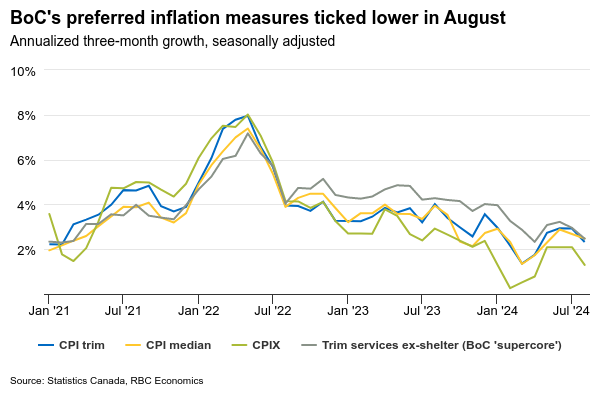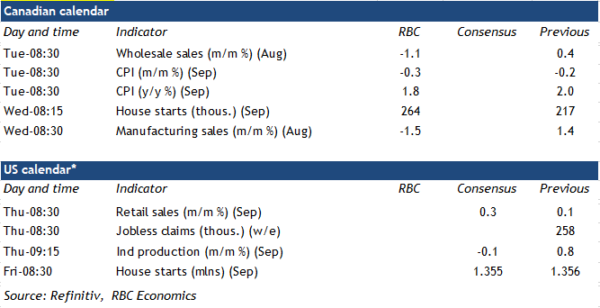Falling energy prices in September likely pushed Canadian inflation even lower than in August when the headline consumer price index fell to the Bank of Canada’s 2% target for the first time in more than three years.
Year-over-year headline CPI is expected to have eased to 1.8% in September from 2% in August, while the sub-index that strips out more volatile food and energy components held steady at 2.4%. Bank of Canada’s preferred core inflation measures (CPI trim, median and ‘supercore’) are expected to on balance have dropped lower on a three-month annualized basis. This signals price pressures continued to unwind in line with a very weak near-term outlook for the economy. Gross domestic product growth in Q3 is on track to disappoint, even with the population still growing at an abnormally fast rate.
In the housing market, which is usually more sensitive to interest rate changes relative to other parts of the economy, the reaction has so far been relatively subdued. Early reports from regional real estate boards showed activities in Canada’s largest markets continued to fluctuate in September with a surge in new listings and inventory putting some downward pressure on prices. We don’t expect a big pick-up in the nationwide resale report in the coming week and expect prices to remain below year-ago levels in September.
All of this points to a growing negative output gap, larger amounts of excess supply in the economy and more disinflationary pressures moving forward. That’s not good news for the BoC who’s worried about downside risks to the economy. At a recent forum, Governor Tiff Macklem highlighted how “recent indicators suggest growth may not be as strong as we expected,” and that they wish to see it strengthen to “stick the landing,” and not have inflation drop persistently below the target range.
The communication alludes to the need for bigger rate cuts than the ones we’ve seen so far. We think the next decision from the BoC will be a bigger 50 basis point reduction in the overnight rate on Oct. 23.
Week ahead data watch
On Tuesday, we expect August core wholesale sales to drop 1.1% in line with Statistics Canada’s early indicator. Sales declines were widespread with lower sales in five out of the seven subsectors.
August manufacturing sales on Wednesday also likely fell by 1.5%, mainly driven by lower sales of petroleum and coal products, and in primary metal subsectors.
Canadian housing starts on Wednesday likely came in at 264,000 in September, up 21% from the prior month and offsetting the decline in August.
On Thursday, U.S. retail sales likely accelerated in September given auto sales were higher. But, sales at gas stations were lower during that month due to lower gas prices.
U.S. industrial production likely came in flat in September, down from 0.8% in August. Lower output in utility and motor vehicle sectors contributed to most of the slowdown.


